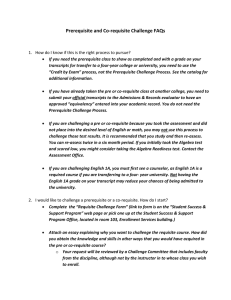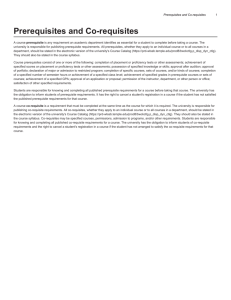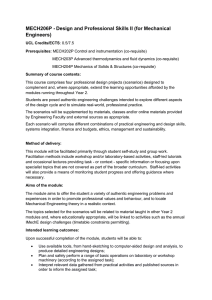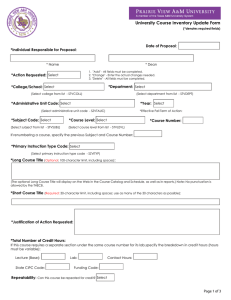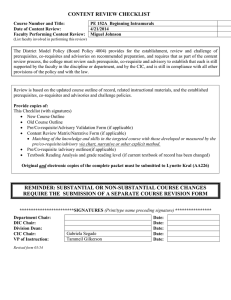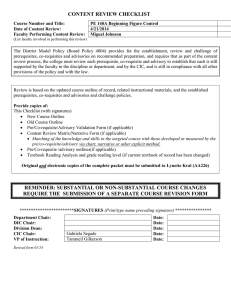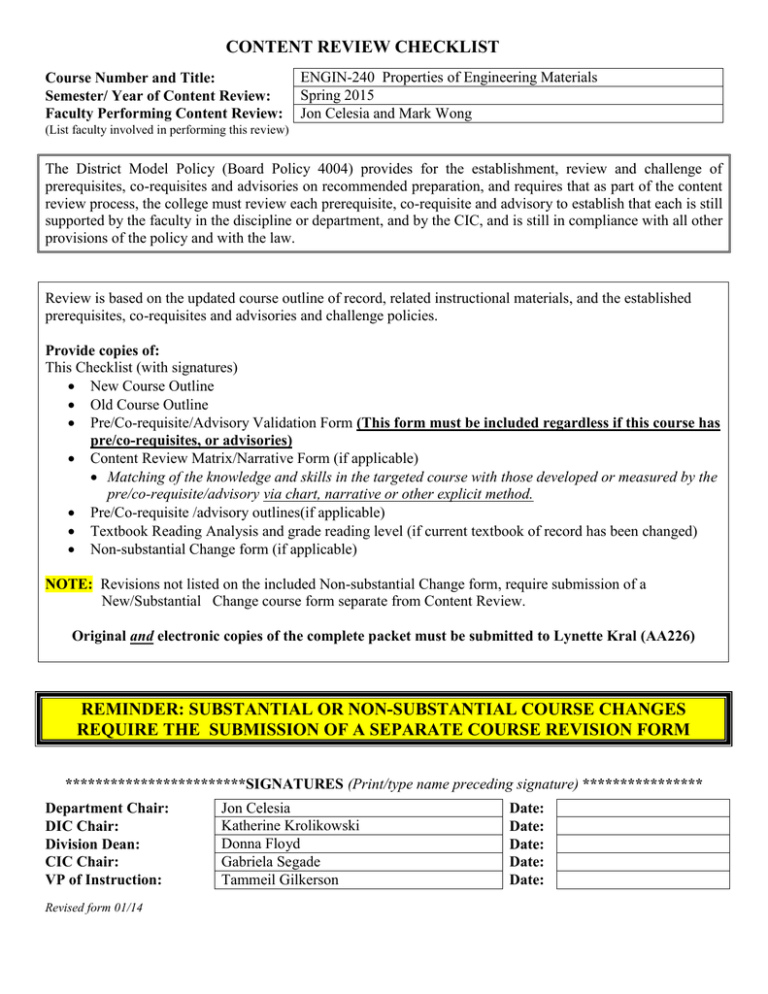
CONTENT REVIEW CHECKLIST
Course Number and Title:
Semester/ Year of Content Review:
Faculty Performing Content Review:
ENGIN-240 Properties of Engineering Materials
Spring 2015
Jon Celesia and Mark Wong
(List faculty involved in performing this review)
The District Model Policy (Board Policy 4004) provides for the establishment, review and challenge of
prerequisites, co-requisites and advisories on recommended preparation, and requires that as part of the content
review process, the college must review each prerequisite, co-requisite and advisory to establish that each is still
supported by the faculty in the discipline or department, and by the CIC, and is still in compliance with all other
provisions of the policy and with the law.
Review is based on the updated course outline of record, related instructional materials, and the established
prerequisites, co-requisites and advisories and challenge policies.
Provide copies of:
This Checklist (with signatures)
New Course Outline
Old Course Outline
Pre/Co-requisite/Advisory Validation Form (This form must be included regardless if this course has
pre/co-requisites, or advisories)
Content Review Matrix/Narrative Form (if applicable)
Matching of the knowledge and skills in the targeted course with those developed or measured by the
pre/co-requisite/advisory via chart, narrative or other explicit method.
Pre/Co-requisite /advisory outlines(if applicable)
Textbook Reading Analysis and grade reading level (if current textbook of record has been changed)
Non-substantial Change form (if applicable)
NOTE: Revisions not listed on the included Non-substantial Change form, require submission of a
New/Substantial Change course form separate from Content Review.
Original and electronic copies of the complete packet must be submitted to Lynette Kral (AA226)
REMINDER: SUBSTANTIAL OR NON-SUBSTANTIAL COURSE CHANGES
REQUIRE THE SUBMISSION OF A SEPARATE COURSE REVISION FORM
************************SIGNATURES (Print/type name preceding signature) ****************
Department Chair:
DIC Chair:
Division Dean:
CIC Chair:
VP of Instruction:
Revised form 01/14
Jon Celesia
Katherine Krolikowski
Donna Floyd
Gabriela Segade
Tammeil Gilkerson
Date:
Date:
Date:
Date:
Date:
NON-SUBSTANTIAL COURSE/CATALOG CHANGE DURING CONTENT REVIEW
Please mark an "X" in the box of the item that has been revised.
X
Course Title
Course Description
Hours per term
Grade Option
Pre/Co-requisite/Advisory
X
Course Objectives/Course Content
Methods of Instruction
Outside Class Weekly Assignments
Instructional Materials
Student Evaluation
Reason for Change
CURRENT COURSE INFORMATION (Fill in the current department/course number/title and only areas that are being revised)
ENGIN-240 Properties of Engineering Materials
Course Number/Title:
Hours per semester:
Lecture:
Grade Option:
Letter
72
Lab:
36
HBA (Lecture):
Student Choice
HBA (Lab):
Pass/No Pass
Pre-requisite(s):
Co-requisite(s):
Advisory(ies):
CHANGE TO: Check box and fill in those parts that are being revised.
Course Title (limited to 39 character spaces):
Course Catalog Description: (Type new course description in expanding box below)
X
Hours per term:
Lecture:
54
Lab:
Grade Option:
Letter Grade
Prerequisite:
Delete:
Add:
Prerequisite:
Delete:
Add:
Co-requisite:
Delete:
Add:
Co-requisite:
Delete:
Add:
Advisory:
Delete:
Add:
54
Student Choice
HBA (Lecture):
Pass/No Pass
HBA (Lab):
This form must be included regardless if this course has pre/co-requisites, or advisories
CONTRA COSTA COLLEGE
PRE/CO-REQUISITE/ADVISORY VALIDATION FORM
[Use one validation form per pre/co-requisite, advisory except when Pre/Co-requisites are linked by “or” statements]
Course Number and Title:
ENGIN-240 Properties of Engineering Materials
Pre/Co-requisite/Advisory to be validated:
X Yes
No
PHYS-130 and CHEM-120
The department has reviewed each prerequisite, co-requisite, or advisory to
establish that each is still supported by the faculty in the discipline or department, or that the
student would not benefit from an additional prerequisite, co-requisite, or advisory to this
course.
Content review is required for any prerequisite, co-requisite, or advisory to determine whether students
who do not meet the specified standard are highly unlikely to receive a satisfactory grade in the course
[Title 5, Section 55201 (b) (1]. This validation is separate from course approval. Additional scrutiny may be
required, depending on the type of pre/co-requisite.
Directions: Circle, or highlight one of the following and attach required justification AND content review
documentation.
1.
This course has no course pre/co-requisites or advisories.
2.
The course is an advisory only.
3.
This is a lab course. The primary course, ___________________, will have the validation evidence.
4.
This pre/co-requisite is required in order to make the course acceptable for transfer by the UC or CSU
systems. Attach documentation (catalog descriptions) from three or more UC/CSU campuses.
5.
This course is part of a sequence of courses within and/or across disciplines. Attach a copy of the course
outline that includes a list of the specific skills and knowledge that the student must possess to be ready
to take the course.
6.
The prerequisite is required for enrollment in a program.
Program name: ________________________ Program prerequisite(s) must be approved as provided for
at least one required course in the program, of which this is one. Attach copy of course outline
specifying skills and/or knowledge that student must possess.
7.
This prerequisite is required for the health or safety of the students in the course; students who lack this
prerequisite might endanger themselves or other students. Attach a copy of the course outline that
specifically lists what the student must possess before entering the course.
8.
This pre/co-requisite is required by law or government regulation. Attach a copy of pertinent law or
regulation.
9.
This pre/co-requisite is one of recency or another measure of readiness. Attach both a copy of the course
outline listing the specific skills student must possess AND data gathered as directed by the District
Model Policy.
10.
This prerequisite involves a limitation on enrollment. This includes auditions for performance courses,
honors courses or sections, and blocks of courses or sections created to set up a cohort of students (such
as PACE). Attach documentation as directed by pertinent sections of the District Model Policy.
***
NOTE: In addition to rigorous content review, an instructor may request a study of the empirical relationship between a
prerequisite course (or placement tool) and subsequent student performance in the targeted course. The rigor of content
review will be established on a college-wide basis in conjunction with District research requirements.
Revised form 01/14
CONTENT REVIEW MATRIX
FOR EVALUATING PRE/CO-REQUISITES/ADVISORIES
Pre/Co-requisites must have established challenge policies
Course Number:
Course Title:
Pre-requisite:
Co-requisite:
Advisory:
ENGIN-240
Properties of Engineering Materials
PHYS-130
Pre/Co-requisite Challenge Policy:
Departmental Exam or Proof of Completion of Equivalent Course
List entrance skills/body of knowledge: (APPLICABLE Course CONTENT of course being reviewed)
1.
Understanding of Newton’s Laws
2.
Understanding of vectors
3.
Understanding of energy and work
4.
Understanding of statics
5.
Ability to take and interpret data in lab settings
6.
Understanding of fluid mechanics
7.
Understanding of oscillations and waves
8.
9.
10.
Entrance skills/body of
knowledge
List exit skills of proposed pre/co-requisite: (APPLICABLE Course CONTENT of pre/co-req./advisory)
1.
Basic kinematics
2.
Newton’s Laws
3.
Work and energy
4.
Momentum
5.
Rotational motion
6.
Statics
7.
Gravitation
8.
Fluid mechanics
9.
Oscillations and waves
1.
2.
3.
4.
5.
6.
7.
8.
9.
10.
Exit skills of proposed pre/co-req./advisory
1. 2. 3. 4. 5. 6. 7. 8. 9.
X
X
X
X
X
X
Or, list conclusions below regarding the necessity and appropriateness of the proposed pre-requisite, co-requisite, or advisory.
Revised form 01/14
CONTENT REVIEW MATRIX
FOR EVALUATING PRE/CO-REQUISITES/ADVISORIES
Pre/Co-requisites must have established challenge policies
Course Number:
Course Title:
Pre-requisite:
Co-requisite:
Advisory:
ENGIN-240
Properties of Engineering Materials
CHEM-120
Pre/Co-requisite Challenge Policy:
Departmental Exam or Proof of Completion of Equivalent Course
List entrance skills/body of knowledge: (APPLICABLE Course CONTENT of course being reviewed)
1.
Basic knowledge of chemistry terms
2.
Basic laboratory skills
3.
Knowledge of atomic structure
4.
Ability to read and understand a periodic table of elements
5.
Knowledge of chemical reactions
6.
Familiarity with phase diagrams
7.
8.
9.
10.
Entrance skills/body of
knowledge
List exit skills of proposed pre/co-requisite: (APPLICABLE Course CONTENT of pre/co-req./advisory)
Recognize and name a variety of the most common inorganic compound types.
1.
2.
Apply fundamental concepts of nomenclature, electronic structure, chemical bonding, stoichiometry, phases, and
thermochemistry to a variety of chemical reactions listed in the course content outline.
3.
Solve nomenclature, electronic structure, chemical bonding, stoichiometry, phase composition and property, and
thermochemistry problems of single and multicomponent chemical systems.
4.
Carry out a variety of general chemistry laboratory operations, applying appropriate judgment and safe work habits in the
use and study of chemical compounds.
5.
Maintain a laboratory notebook with observations and comments and write laboratory reports describing and
interpreting the results obtained in the laboratory.
1.
2.
3.
4.
5.
6.
7.
8.
9.
10.
1.
X
Exit skills of proposed pre/co-req./advisory
2. 3. 4. 5. 6. 7. 8. 9. 10.
X
X X
X
X X
X X
X
Or, list conclusions below regarding the necessity and appropriateness of the proposed pre-requisite, co-requisite, or advisory.
Revised form 01/14
Contra Costa College
Course Outline
Course Number
Course Title
Prerequisite
Challenge Policy
ENGIN-240
Properties of Engineering Materials
PHYS-130 and CHEM-120
Departmental Exam or Proof of Completion of
Equivalent Course
Co-requisite
Challenge Policy
Advisory
*HOURS BY ARRANGEMENT:
Number of Weeks
Lecture Hours By Term
Lab Hours By Term
*Hours By Arrangement
Units
18
54
54
4
Hours per term.
ACTIVITIES: (Please provide a list of the activities students will perform in order to satisfy the HBA requirement):
COURSE/CATALOG DESCRIPTION
This course is designed to study the mechanical properties related to the internal structures and selection of materials.
Methods of changing mechanical properties of metals, polymers, ceramics, concrete, wood and composite materials
and an introduction to the electrical properties of semiconducting materials are presented. The importance of
materials’ properties in engineering design and how to manipulate these properties are examined.
COURSE OBJECTIVES:
At the completion of the course the student will be able to:
Evaluate the mechanical properties, internal structure and adaptability of various materials such as cast iron, steel,
nonferrous metals, plastics, wood, concrete and composite materials.
Evaluate the electrical properties of semiconducting materials.
Discuss the properties of materials as related to atomic structure and microstructure.
Explain the methods of changing mechanical properties.
Discuss the importance of properties in design, including the effects of different manufacturing techniques on
properties.
INTENDED STUDENT LEARNING OUTCOMES:
Students will be able to evaluate the mechanical properties, internal structure and adaptability of various
materials such as cast iron, steel, nonferrous metals, plastics, wood, concrete, and composite materials.
Students will be able to evaluate the electrical properties of semiconducting materials
Students will be able to discuss the properties of materials as related to atomic structure and microstructure.
Students will be able to explain the methods of changing mechanical properties
Students will be able to discuss the importance of properties in design, including the effects of different
manufacturing techniques on properties.
COURSE CONTENT (Lecture):
1. Properties of materials
(a) Interatomic forces
(b) Crystalline structure
(c) Physical properties and measurements
(d) Chemical properties
(e) Control of properties
2. Iron-carbon alloys
(a) Cast iron
(b) Steel
(c) Alloys of steel
3. Non-ferrous metals
(a) Mining, preparation, and alloying
(b) Types
(c) Uses
4. Non-metallic inorganic materials
(a) Stone
(b) Ceramics, glass
(c) Portland cement and concrete
5. Organic materials
(a) Plastics
(b) Wood
(c) Rubber
(d) Asphalt and asphaltic concrete
6. Synthetic composite materials
(a) Types
(b) Processing
(c) Properties
7. Environment effects
(a) Corrosion
(b) Oxidation
(c) Radiation
8. Electrical and optical properties
(a) Conductivity
(b) Semiconductors
(c) Light emission and absorption
(d) Optical fibers
COURSE CONTENT (Lab):
Error propagation and uncertainties
Computational modeling of bonding of solids
Computational modeling of X-ray diffraction
Tensile testing
Brinell hardness testing
Thermal properties (heat capacity/thermal expansion)
Impact testing
Torsion testing
Jominy end quench I (end quench testing)
Jominy end quench II (Rockwell Hardness Testing)
Solar cells
Composite materials
METHODS OF INSTRUCTION:
Classroom presentation includes lecture and demonstration.
Laboratory experiments.
INSTRUCTIONAL MATERIALS:
NOTE: To be UC/CSU transferable, the text must be dated within the last 7 years OR a statement of justification for a text beyond the
last 7 years must be included.
Textbook Title:
Author:
Publisher:
Edition/Date:
Justification Statement:
Textbook Reading Level:
Lab Manual Title
Author:
Publisher:
Edition/Date:
Introduction to Materials Science for Engineers
James Shackelford
Pearson Prentice Hall
8th Edition / 2014
(For textbook beyond 7 years)
Contra Costa College Engineering 240 Lab Manual
Contra Costa College Astronomy/Physics/Engineering/Geology Department
CCC Bookstore
Spring 2015
OUTSIDE OF CLASS WEEKLY ASSIGNMENTS:
Title 5, section 55002.5 establishes that a range of 48 -54hours of lecture, study, or lab work is required for one unit of credit.
For each hour of lecture, students should be required to spend an additional two hours of study outside of class to earn one
unit of credit.
Title 5, section 55002(a) 2F establishes that coursework calls for critical thinking and the understanding and application of concepts
determined by the curriculum committee to be at college level.
For degree applicable courses: List one example of critical thinking homework
Outside of Class Weekly Assignments
Hours per week
Weekly Reading Assignments (Include detailed assignment below, if applicable)
3
Read Chapter 2: Atomic Bonding, pages 22-57
Weekly Writing Assignments (Include detailed assignment below, if applicable)
Weekly Math Problems (Include detailed assignment below, if applicable)
3
Ch 2 Problems: 2.1, 2.3, 2.8, 2.14,2.16, 2.17
Critical thinking homework example:
Plot the stress - strain curve for a ductile metal and show the yield stress, the maximum tensile strength and the
failure stress. How will you measure the ductility of this metal?
Lab or Software Application Assignments (Include detailed assignment below, if applicable)
Other Performance Assignments (Include detailed assignment below, if applicable)
STUDENT EVALUATION: (Show percentage breakdown for evaluation instruments)
Title 5, section 55002 (a) 2A establishes that the grade is based on demonstrated proficiency in subject matter and the ability to
demonstrate that proficiency.
For degree applicable courses: Course requires essay writing, or, in courses where the curriculum committee deems them
to be appropriate, by problem solving exercises, or skills demonstrations by students.
%
Essay
70
15
15
%
Computation or Non-computational Problem Solving Skills
%
Skills Demonstration
%
Objective Examinations
%
%
%
Other (describe)
Lab assignments
Homework
GRADING POLICY: (Choose LG, P/NP, or SC)
Pass / No Pass
X Letter Grade
90% - 100% = A
80% - 89% = B
70% - 79% = C
60% - 69% = D
Below 60% = F
70% and above = Pass
Below 70% = No Pass
Student Choice
90% - 100% = A
80% - 89% = B
70% - 79% = C
60% - 69% = D
Below 60% = F
Percentages vary from instructor
to instructor
or
70% and above = Pass
Below 70% = No Pass
Prepared by: Jon Celesia and Mark Wong
Date: Spring 2015
Revised form 09/14

